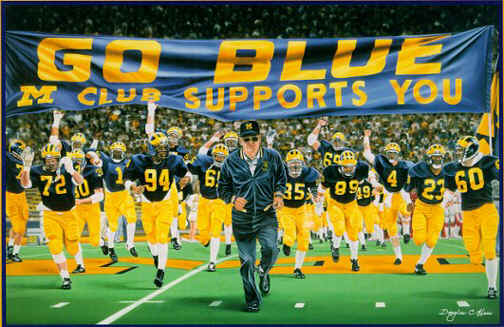Game Management
 Coach Rod's weekly press conference is tomorrow (Monday) at 11:00 a.m. at which time he will have to face another series of tough questions about why Michigan has lost five (5) consecutive Big 10 conference games. At the postgame press conference, Coach Rod invoked his common refrain that "We're not good enough to make big mistakes and beat anybody on our schedule." Coach Rod is always very quick to point out that the problems stem from lack of execution by the players (see Purdue's successful onside kick) lest anyone think of blaming him or his staff.
Coach Rod's weekly press conference is tomorrow (Monday) at 11:00 a.m. at which time he will have to face another series of tough questions about why Michigan has lost five (5) consecutive Big 10 conference games. At the postgame press conference, Coach Rod invoked his common refrain that "We're not good enough to make big mistakes and beat anybody on our schedule." Coach Rod is always very quick to point out that the problems stem from lack of execution by the players (see Purdue's successful onside kick) lest anyone think of blaming him or his staff.Coach Rod is right, however, about the need to avoid big mistakes. Michigan's talent level leaves little margin for error as it is battling for victory with the schools on its schedule. In the 10 games the Wolverines have played this season, four of its games have been decided by 4 points or fewer and a 5th game (vs. MSU) went into overtime. Michigan is 2-3 in those close contests. In the close games, where the teams are evenly matched and the contest is going down-to-the-wire, the difference between winning and losing rests on the coaching.
Game management is a critical component of a team's ability to succeed in a close game. Coaching staffs spend days in the off-season preparing for every imaginable scenario so that they will be ready to make a decision in the heat of the moment when the time comes in a game. Earlier in the season, Coach Rod faced an interesting "game management" decision. Against MSU, the Wolverines scored with 2 seconds remaining and were down by one. The question was whether to kick the PAT and go to overtime or to try and win it outright on the two-point conversion. Coach Rod never hesitated as he called for the PAT unit which converted the extra-point and sent the game into overtime. Although a case could have been made for going for two, no one really seriously questioned the decisive move made by Coach Rod.
In the Purdue game, however, Coach Rod made a game management decision that the Wolverines could ill afford. Trailing 38-30 with just under 5 minutes remaining in the game, Michigan faced a 4th and 10 from the Purdue 20. A field goal attempt by Jason Olesnavage (9-11 on the season) would have been approximately 37 yards. Olesnavage had already hit a 51-yarder earlier in the game but he had also missed a 48-yarder and an extra-point during the game. Eschewing the truism that "you always take the points", Coach Rod decided to go for it on fourth down despite the long yardage needed for a first down. Michigan failed to convert and turned the ball over on downs. When Michigan got the ball back and scored with just over 2 minutes to go, it had to go for two to try and tie the game. If they had the points from the field goal that Coach Rod decided to forego, the Wolverines (theoretically) would have had the lead. Instead, they went for two and failed to convert and ulimately lost by that margin.
Coach Rod is right when he says that Michigan is not good enough to make big mistakes and beat anybody. Coach Rod's game mis-management decision was a major misstep that put the Wolverines in a hole out of which they could not climb. Hopefully, when Coach Rod evaulates what went wrong, he will look in a mirror. The Wolverines need him to make better game management decisions in the future. Go Blue!
*Note: Photo of Coach Rod during the Purdue game (11-7-09) by David Guralnick/The Detroit News.


3 Comments:
Was that really a mistake? No, with the way your D is playing you can't assume you will get the ball and since it is still a one possession game you have to take the chance to tie the game there.
Big surprise that you are making posts again. Could you be any more anti-RR?
These decisions are not as cut and dry as you make them out. Compelling cases can be made for each option. I think that RR has probably been in each of these situations several times during his coaching career. You win some and you lose some. However, when things are bad and the team is losing often these types of decisions get magnified. I still prefer these types of decisions to previous regimes running it up the gut ad nauseum and basically giving other teams chances to win, instead of more creative play calling.
The biggest mistake in my mind by RR was not using the time out before half time and not going for a blocked punt, letting Hemmingway run it back, or forcing Purdue not to make a bad snap. Instead, they ran to the locker room up 14 instead of maybe 17 or even 21. I think not forcing that punt was the equivalent of playing scared.
Post a Comment
<< Home